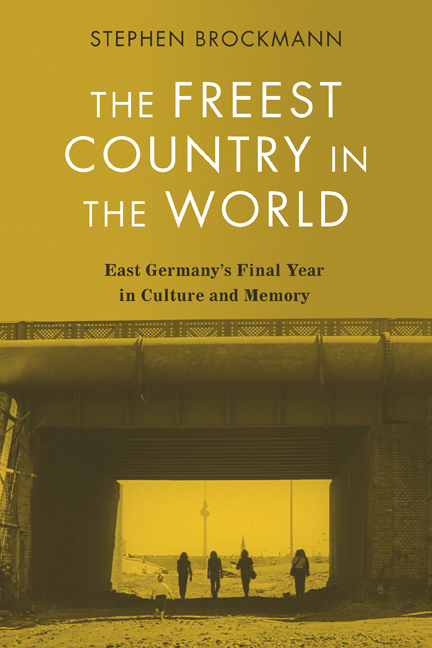Book contents
- Frontmatter
- Dedication
- Contents
- Acknowledgments
- Introduction: The Memory of Freedom
- 1 Protocols of History: Reunification Documentaries from 1989/1990
- 2 Anarchy in the GDR
- 3 The National Liberation Zone
- 4 Coming of Age as the State Dies: Three Novels and Their Heroes
- 5 Provincial Theater: Fiction Film Struggles to Address German Reunification in the Early 1990s
- 6 The Grand Theater of the East and the Imaginary Stasi: The Emergence of the Standard Depiction of German Reunification in Film and on Television
- 7 Ritual, Repetition, and Memory: Commemorating and Memorializing 1989/1990
- Conclusion: The Last GDR
- Selected Works Cited
- Filmography
- Index
5 - Provincial Theater: Fiction Film Struggles to Address German Reunification in the Early 1990s
Published online by Cambridge University Press: 11 January 2024
- Frontmatter
- Dedication
- Contents
- Acknowledgments
- Introduction: The Memory of Freedom
- 1 Protocols of History: Reunification Documentaries from 1989/1990
- 2 Anarchy in the GDR
- 3 The National Liberation Zone
- 4 Coming of Age as the State Dies: Three Novels and Their Heroes
- 5 Provincial Theater: Fiction Film Struggles to Address German Reunification in the Early 1990s
- 6 The Grand Theater of the East and the Imaginary Stasi: The Emergence of the Standard Depiction of German Reunification in Film and on Television
- 7 Ritual, Repetition, and Memory: Commemorating and Memorializing 1989/1990
- Conclusion: The Last GDR
- Selected Works Cited
- Filmography
- Index
Summary
RELATIVELY FEW contemporaneous German fiction films addressed the collapse of the German Democratic Republic and the reunification of Germany. Most German fiction films dealing with these issues were created many years after the events that they depict. The situation with fiction film is thus significantly different from the situation with documentary film. As Chapter 1 demonstrated, at least ten documentary films were made in 1989–1990 that addressed the political events occurring in the eastern part of Germany during those years. Many of those documentaries were made by East Germans themselves. By contrast, not a single East German fiction film made in 1989–1990 addressed the political events of those years, and very few eastern German films made shortly thereafter (by 1994) directly addressed those events.
There are two major reasons why fiction film was slower to deal with political events in East Germany than documentary film. The first is that fiction film generally takes longer to plan and create than documentary film. First someone has to write a treatment and ultimately a script, and then the project has to find a producer and a director. The project has to be discussed and approved in committees, and it needs funding. Actors and a cinematographer must be located. This process usually takes years.
By contrast, a documentary filmmaker with access to a movie camera can quickly travel to Leipzig or Dresden, if he or she chooses, and a documentary film about current events as they are taking place requires little in the way of crew or equipment: just a few people to handle lighting, sound, and camera work. No actors are necessary, nor is there a need for a script or story boards. Instead, a filmmaker such as Andreas Voigt found the material for his documentaries on the streets of Leipzig and in interviews with people whom he singled out from the crowd. Thus Leipzig im Herbst, Voigt's film about the revolutionary events in Leipzig in the fall of 1989, was actually filmed in the fall of 1989, and it had its premier only a few months later, at the Berlin International Film Festival on February 10, 1990, at a time when the GDR still existed. Such speed is virtually impossible for conventional fiction film.
- Type
- Chapter
- Information
- The Freest Country in the WorldEast Germany's Final Year in Culture and Memory, pp. 198 - 225Publisher: Boydell & BrewerPrint publication year: 2023

